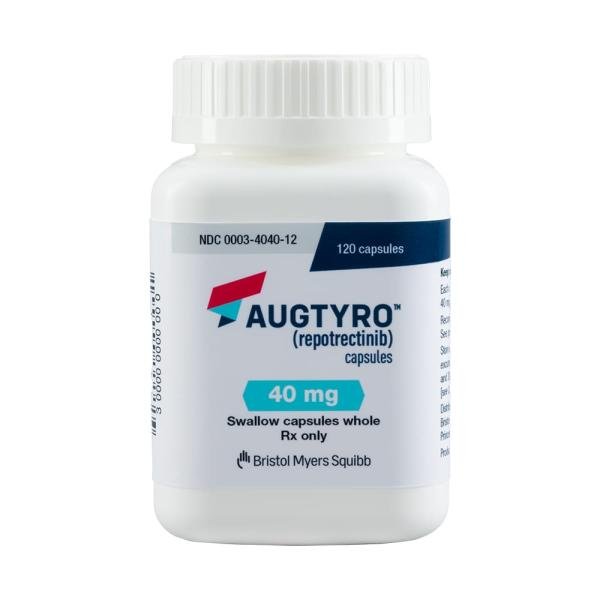Augtyro Side Effects
Generic name: repotrectinib
Medically reviewed by Drugs.com. Last updated on Nov 30, 2023.
Note: This document contains side effect information about repotrectinib. Some dosage forms listed on this page may not apply to the brand name Augtyro.
Applies to repotrectinib: oral capsule.
Warning
Call your doctor if you have nervous system problems such as weakness, vision or hearing problems, dizziness, mood changes, vertigo (spinning sensation), problems with balance or coordination, problems with thinking or memory, hallucinations, or sleep problems.
Get emergency medical help if you have signs of an allergic reaction: hives, difficult breathing, swelling of your face, lips, tongue, or throat.
Call your doctor at once if you have:
-
nervous system problems--weakness, vision or hearing problems, dizziness, mood changes, vertigo (spinning sensation), problems with balance or coordination, problems with thinking or memory, hallucinations, sleep problems;
-
high levels of uric acid in blood--joint problems, stomach pain, little or no urination, nausea, vomiting, pink or brown urine;
-
lung problems--fever, wheezing, dry cough, chills, cough with mucus, chest pain, feeling short of breath;
-
muscle or bone problems--severe bone pain, severe joint or muscle pain, tenderness, weakness; or
-
liver problems--loss of appetite, nausea, vomiting, stomach pain (upper right side), tiredness, itching, dark urine, clay-colored stools, jaundice (yellowing of the skin or eyes).
Your cancer treatments may be changed or permanently discontinued if you have certain side effects.
Common side effects may include:
-
dizziness, tiredness;
-
changes in your sense of taste, nausea;
-
numbness or tingling, loss of balance or coordination;
-
hallucinations, problems with thinking or memory.
This is not a complete list of side effects and others may occur. Call your doctor for medical advice about side effects.
For Healthcare Professionals
Applies to repotrectinib: oral capsule.
General
The most frequently reported side effects included ataxia, cognitive disorders, constipation, dizziness, dysgeusia, dyspnea, fatigue, nausea, and peripheral neuropathy.
The most frequently reported grade 3 or 4 laboratory abnormalities included decreased hemoglobin, decreased leukocytes, decreased lymphocytes, decreased neutrophils, decreased phosphate, decreased sodium, increased ALT, increased alkaline phosphatase, increased AST, increased creatine phosphokinase, increased GGT, increased glucose, increased magnesium, and increased urate.[Ref]
Cardiovascular
Frequency not reported: Cardiac arrest, cardiac failure, sudden cardiac death, sudden death
Gastrointestinal
Very common (10% or more): Constipation (up to 37%), nausea (up to 20%), diarrhea (up to 13%), vomiting (10%)
Hematologic
Very common (10% or more): Decreased hemoglobin (up to 73%), decreased lymphocytes (up to 43%), decreased leukocytes (up to 36%), decreased neutrophils (up to 34%), increased activated partial thromboplastin time (up to 25%), increased prothrombin INR (up to 20%)
Frequency not reported: Disseminated intravascular coagulation
Hepatic
Very common (10% or more): Increased GGT (up to 48%), increased AST (up to 40%), increased ALT (up to 35%)
Frequency not reported: Hepatotoxicity
Metabolic
Very common (10% or more): Increased glucose (up to 23%), increased urate (up to 21%)
Common (1% to 10%): Hyperuricemia
Musculoskeletal
Very common (10% or more): Increased creatine phosphokinase (up to 57%), muscular weakness (up to 21%), myalgia (up to 13%)
Common (1% to 10%): Skeletal fractures
Myalgia included myalgia, myositis, musculoskeletal discomfort, and musculoskeletal pain.
Nervous system
Very common (10% or more): Central nervous system (CNS) adverse reactions (up to 75%), dizziness (up to 64%), dysgeusia (up to 50%), peripheral neuropathy (up to 47%), ataxia (up to 29%), cognitive disorders (up to 23%), headache (up to 19%), memory impairment (13%), disturbance in attention (11%)
Common (1% to 10%): CNS toxicity, somnolence, hypersomnia
Frequency not reported: Tremor
Dizziness included dizziness, vertigo, postural dizziness, exertional dizziness, and positional vertigo.
Dysgeusia included dysgeusia, ageusia, anosmia, and hypogeusia.
Peripheral neuropathy included neuralgia, peripheral neuropathy, peripheral sensory neuropathy, dysesthesia, peripheral motor neuropathy, polyneuropathy, paresthesia, hypoesthesia, and hyperesthesia.
Ataxia included ataxia, gait disturbance, balance disorder, and cerebellar ataxia.
Cognitive disorders included memory impairment, disturbance in attention, cognitive disorder, confusional state, amnesia, attention deficit hyperactivity disorder, delirium, altered state of consciousness, aphasia, delusion, depressed level of consciousness, hallucination, mental status changes, and neurological decompensation.
Headache included headache, migraine, and tension headache.
Ocular
Very common (10% or more): Vision disorders (up to 11%)
Vision disorders included blurred vision, dry eye, visual impairment, visual field defect, cataract, conjunctivitis, eye pain, photophobia, photosensitivity reaction, reduced visual acuity, vitreous floaters, blepharospasm, color blindness, diplopia, eye hematoma, eye swelling, eyelid disorder, eyelid injury, eyelid pruritus, glaucoma, night blindness, and ophthalmic herpes zoster.
Other
Very common (10% or more): Fatigue (up to 29%), increased sodium (up to 29%), increased alkaline phosphatase (up to 26%), decreased glucose (up to 21%), increased weight (up to 14%), edema (up to 12%)
Common (1% to 10%): Decreased phosphate, decreased sodium, fall, increased magnesium, pyrexia
Frequency not reported: Death
Fatigue included fatigue and asthenia.
Edema included generalized edema, periorbital edema, localized edema, face edema, peripheral edema, edema, eye edema, and scrotal edema.
Psychiatric
Common (1% to 10%): Confusional state, mood disorders, insomnia, anxiety, irritability, depression
Respiratory
Very common (10% or more): Dyspnea (up to 30%), cough (up to 14%)
Common (1% to 10%): Pneumonia, pleural effusion, hypoxia, pneumonitis
Uncommon (0.1% to 1%): Interstitial lung disease
Frequency not reported: Aspiration pneumonia, respiratory failure
Dyspnea included dyspnea and exertional dyspnea.
Cough included productive cough, cough, and upper-airway cough syndrome.
More about Augtyro (repotrectinib)
- Check interactions
- Compare alternatives
- Pricing & coupons
- Drug images
- Dosage information
- During pregnancy
- FDA approval history
- Drug class: multikinase inhibitors
- Breastfeeding
- En español
Patient resources
Professional resources
Related treatment guides
References
1. Product Information. Augtyro (repotrectinib). Bristol-Myers Squibb. 2023;ORIG-1.
Further information
Always consult your healthcare provider to ensure the information displayed on this page applies to your personal circumstances.
Some side effects may not be reported. You may report them to the FDA.

